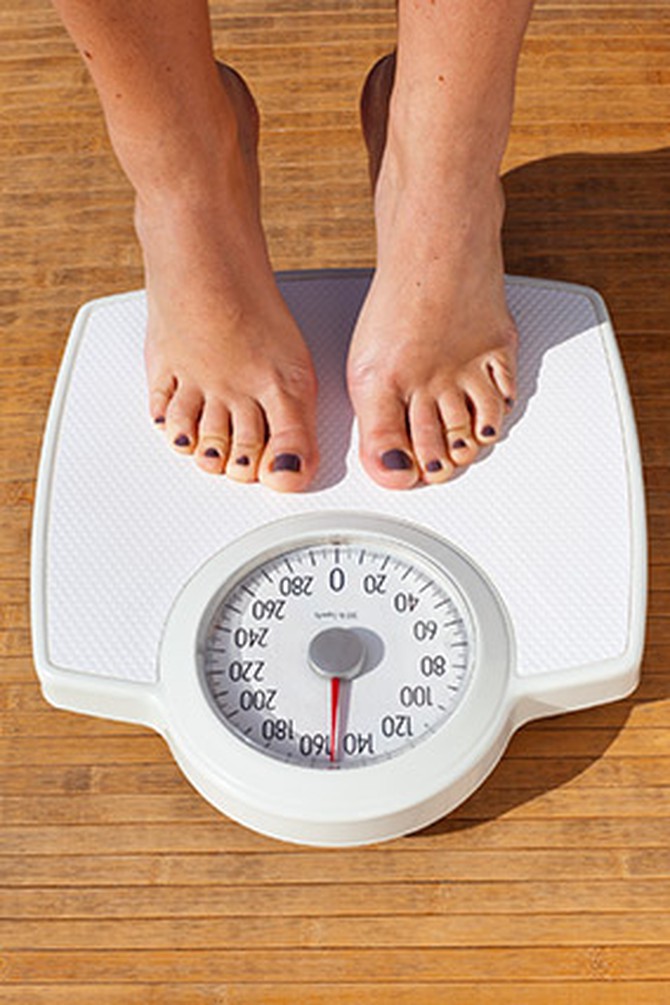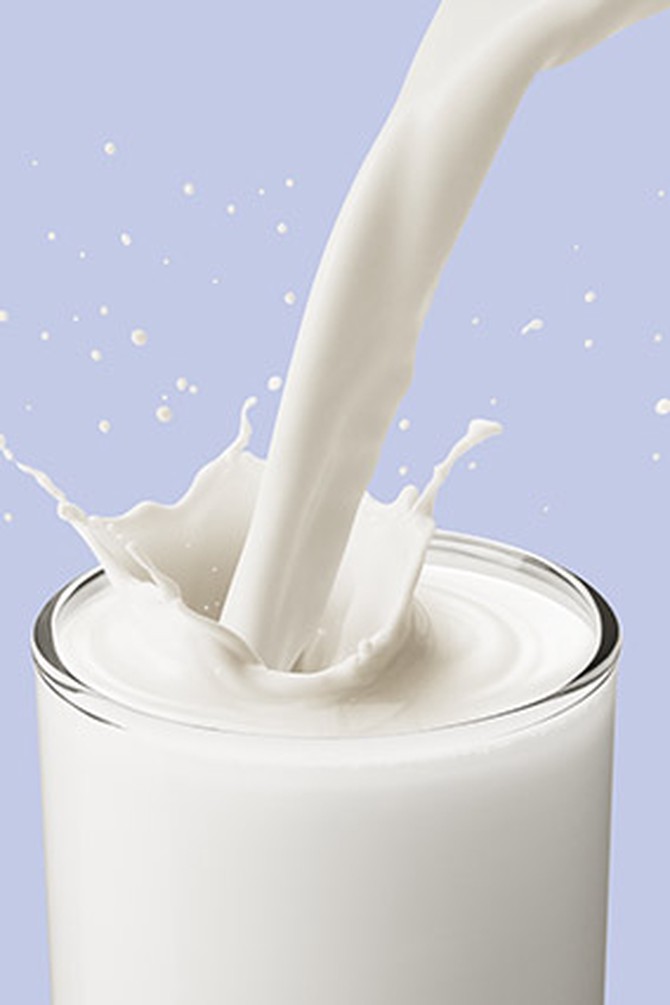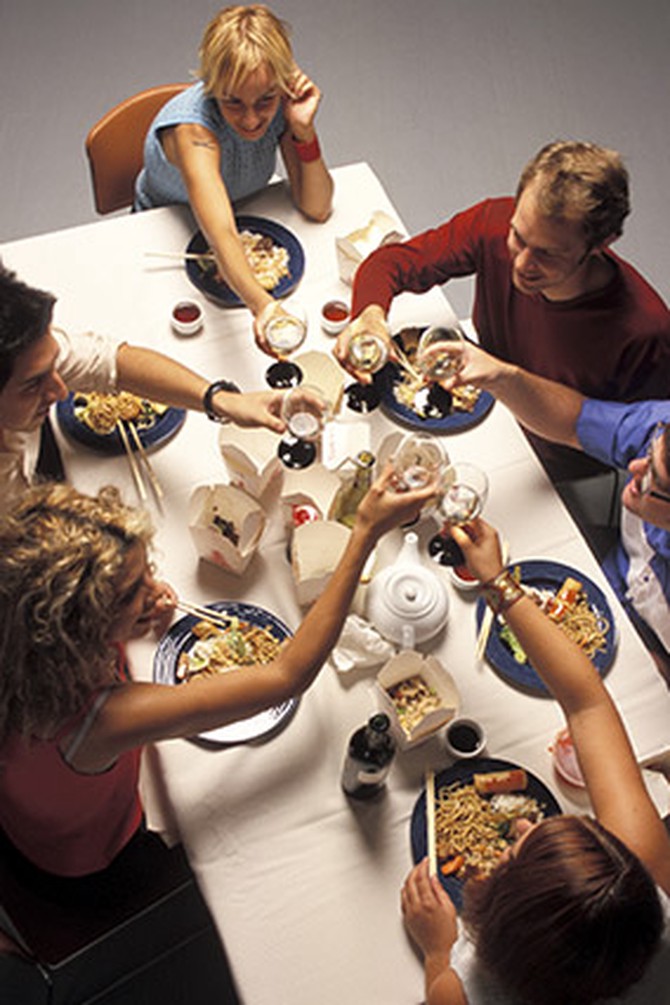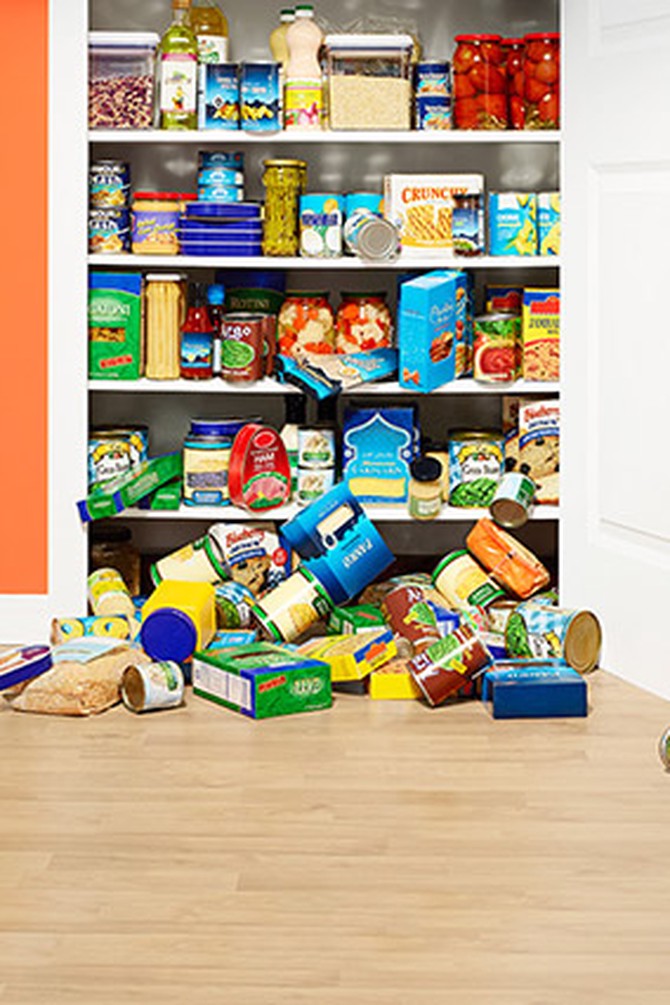5 Seemingly Innocent Things That Lead to Weight Gain
You don't stint on sleep or drink diet soda or lose your mind at the all-you-can eat BBQ. So how did you manage to put on four and a half pounds this year?
By Jena Pincott

Photo: Thinkstock
You Doubled Down on the Quantified Life
Your mistake: You believe wholeheartedly in the “If you can measure it, you can manage it” theorem.
That's right, we're recommending that you ditch your digital scale with the two decimal places. When dieters at the University of Utah received a “health index score” that was pleasingly vague—a weight range rather than an actual number—they lost up to four pounds in just three weeks. In contrast, when participants received their score in the form of an exact number, they gained up to a pound on average. The fuzzier the feedback, the more room there was to interpret it optimistically, the study concluded. (“Almost there!”) As a result, the goal seems more achievable—and we become more motivated. On the flip side, a precise number makes us aware of when we're not doing well—which all too often drives our discouraged self to lapse or quit.
The lesson: If you weigh yourself daily, even normal fluctuations could throw you off. Instead, get on the scale weekly and use a range as a goal (“I'd like to lose 5 to 10 pounds this year”).
That's right, we're recommending that you ditch your digital scale with the two decimal places. When dieters at the University of Utah received a “health index score” that was pleasingly vague—a weight range rather than an actual number—they lost up to four pounds in just three weeks. In contrast, when participants received their score in the form of an exact number, they gained up to a pound on average. The fuzzier the feedback, the more room there was to interpret it optimistically, the study concluded. (“Almost there!”) As a result, the goal seems more achievable—and we become more motivated. On the flip side, a precise number makes us aware of when we're not doing well—which all too often drives our discouraged self to lapse or quit.
The lesson: If you weigh yourself daily, even normal fluctuations could throw you off. Instead, get on the scale weekly and use a range as a goal (“I'd like to lose 5 to 10 pounds this year”).

Photo: Thinkstock
You've Read the Research on Coffee
Your mistake: Inspired by coffee's health perks, you drink five servings—or more—a day.
Research does indeed show that the coffee cup runneth over with health benefits: It's linked with a reduced risk of type-2 diabetes and some cancers, and improved cardiovascular function. But there may be a point at which coffee drinking backfires bitterly: around five cups. A polyphenol in coffee called chlorogenic acid (CGA) is the cause, suggests a study on rodents at the University of Western Australia. The good news is that CGA in moderation is beneficial and thought to aid weight loss. The bad news is that in excess it may actually worsen the effects of a bad diet. Lab mice that consumed the equivalent amount of CGA in five or six cups of coffee gained more weight despite the compound's reputation as a diet aid. They also developed worse pre-diabetes disorders (increased glucose intolerance and insulin resistance), compared with CGA-free mice that ate the same high-fat food.
The lesson: Research on the interaction between food and the compounds in coffee is ongoing. But, to be safe, especially on days you're eating high-fat foods, consider limiting your intake to three to four cups. The cutoff also applies to decaffeinated coffee and tea, which, sorry to report, also contain CGA.
Research does indeed show that the coffee cup runneth over with health benefits: It's linked with a reduced risk of type-2 diabetes and some cancers, and improved cardiovascular function. But there may be a point at which coffee drinking backfires bitterly: around five cups. A polyphenol in coffee called chlorogenic acid (CGA) is the cause, suggests a study on rodents at the University of Western Australia. The good news is that CGA in moderation is beneficial and thought to aid weight loss. The bad news is that in excess it may actually worsen the effects of a bad diet. Lab mice that consumed the equivalent amount of CGA in five or six cups of coffee gained more weight despite the compound's reputation as a diet aid. They also developed worse pre-diabetes disorders (increased glucose intolerance and insulin resistance), compared with CGA-free mice that ate the same high-fat food.
The lesson: Research on the interaction between food and the compounds in coffee is ongoing. But, to be safe, especially on days you're eating high-fat foods, consider limiting your intake to three to four cups. The cutoff also applies to decaffeinated coffee and tea, which, sorry to report, also contain CGA.

Photo: Thinkstock
You Drink the Seemingly Right (But Wrong) Milk
Your mistake: You substitute skim or low-fat milk for whole or 2 percent.
Wait, don't we drink low-fat milk to stay slim? Yet a study led by Mark DeBoer, MD, a pediatric endocrinologist at the University of Virginia, found that children who drank skim or 1 percent milk gained more weight than those who drank 2 percent or whole (full-fat) milk. He points out that the same link—fattier milk, lower body-mass index—has also emerged in large, long-term studies on adults.) DeBoer's theory is that milk fat, compared with other calorie sources, makes us feel fuller, longer—so we consume fewer calories overall. Instead, many of us drink the seemingly virtuous but unfilling low-fat stuff— then stuff ourselves with refined sugars and starches afterward.
The lesson: If you're a milk drinker, try whole or 2 percent in lieu of reduced-fat milk. A large Swedish study found that among normal-weight women, those who drank one or more cups a day of whole milk had a significantly lower chance of gaining weight than those who drank reduced-fat milk.
Wait, don't we drink low-fat milk to stay slim? Yet a study led by Mark DeBoer, MD, a pediatric endocrinologist at the University of Virginia, found that children who drank skim or 1 percent milk gained more weight than those who drank 2 percent or whole (full-fat) milk. He points out that the same link—fattier milk, lower body-mass index—has also emerged in large, long-term studies on adults.) DeBoer's theory is that milk fat, compared with other calorie sources, makes us feel fuller, longer—so we consume fewer calories overall. Instead, many of us drink the seemingly virtuous but unfilling low-fat stuff— then stuff ourselves with refined sugars and starches afterward.
The lesson: If you're a milk drinker, try whole or 2 percent in lieu of reduced-fat milk. A large Swedish study found that among normal-weight women, those who drank one or more cups a day of whole milk had a significantly lower chance of gaining weight than those who drank reduced-fat milk.

Photo: Thinkstock
You Eat at a Crowded Table
Your mistake: You habitually dine with large groups.
Imagine that you, a careful eater, go out for pizza with friends. Statistically speaking, here's what will happen, reports Brian Wansink, PhD, director of the Cornell Food and Brand Lab, in his book Mindless Eating: Why We Eat More Than We Think. Dining with just one friend, you'll eat about 35 percent more than when alone; with a group of four, about 75 percent more; and in groups of seven or more, 96 percent more. The reasons for overeating: spending a longer time at the table, mimicking our companions' pace often bite-for-bite, especially in the beginning of a meal) and defaulting to the group average.
The lesson: "Sit next to slow eaters," Wansink writes. "They can help you pace your eating, not the speed eaters who eat like they grew up in a family of 12."
Imagine that you, a careful eater, go out for pizza with friends. Statistically speaking, here's what will happen, reports Brian Wansink, PhD, director of the Cornell Food and Brand Lab, in his book Mindless Eating: Why We Eat More Than We Think. Dining with just one friend, you'll eat about 35 percent more than when alone; with a group of four, about 75 percent more; and in groups of seven or more, 96 percent more. The reasons for overeating: spending a longer time at the table, mimicking our companions' pace often bite-for-bite, especially in the beginning of a meal) and defaulting to the group average.
The lesson: "Sit next to slow eaters," Wansink writes. "They can help you pace your eating, not the speed eaters who eat like they grew up in a family of 12."

Photo: David Tsay
You Saved a Bunch of Money
Your mistake: Looking at ready-to-eat multipacks makes you overindulge.
Stockpiled food is consumed twice as fast as other food in the house, concluded Wansink and his colleagues after an experiment in which they supplied families with either large or small multipacks of food. (Think Warholian spreads of either 24 or 8 soup cans.) The problem is simple: Bulky packages consume too much kitchen real estate; we see them every time we open the cupboard, for instance. Visibility translates into impulsivity, and, before we know it, we're eating more than we intended.
The lesson: Out of sight, out of mind. Move multi-unit packs of food out of the kitchen and into the basement, freezer, underground bunker...wherever that cluster of bright labels won't catch your eye. Wansink found that the feeding frenzy was worse in the first eight days that new multipacks are the house. After that, people became less attracted to the food, despite a still-ample supply, and ate about the same amount as they did of less-stockpiled pantry items.
Next: 5 things we didn't know about weight loss
Stockpiled food is consumed twice as fast as other food in the house, concluded Wansink and his colleagues after an experiment in which they supplied families with either large or small multipacks of food. (Think Warholian spreads of either 24 or 8 soup cans.) The problem is simple: Bulky packages consume too much kitchen real estate; we see them every time we open the cupboard, for instance. Visibility translates into impulsivity, and, before we know it, we're eating more than we intended.
The lesson: Out of sight, out of mind. Move multi-unit packs of food out of the kitchen and into the basement, freezer, underground bunker...wherever that cluster of bright labels won't catch your eye. Wansink found that the feeding frenzy was worse in the first eight days that new multipacks are the house. After that, people became less attracted to the food, despite a still-ample supply, and ate about the same amount as they did of less-stockpiled pantry items.
Next: 5 things we didn't know about weight loss
Published 12/19/2013
As a reminder, always consult your doctor for medical advice and treatment before starting any program.

